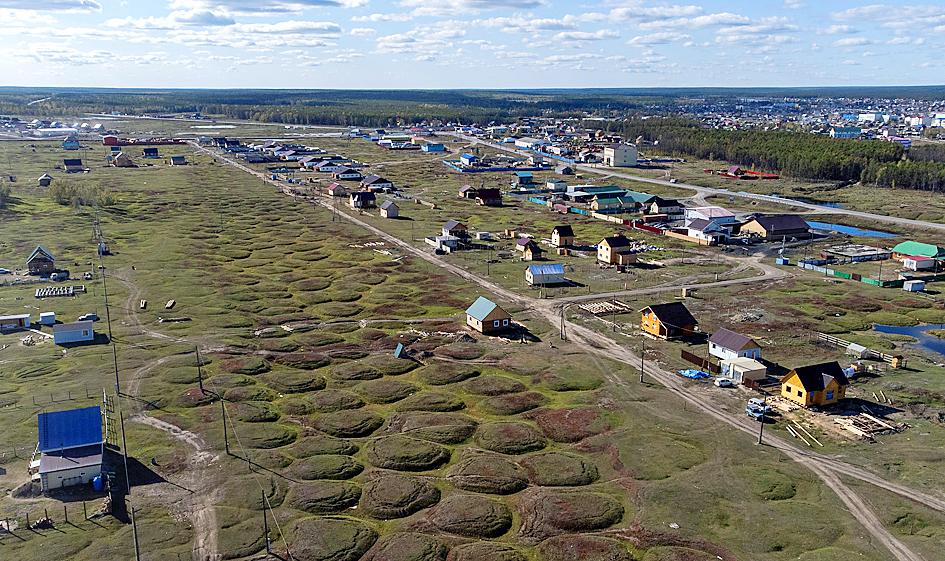The old airport in the Siberian settlement of Churapcha has been unusable for years, its runway transformed into a swampy field of puffed-up mounds and reliefs.
As with cities and towns across northern and northeastern Russia, Churapcha is experiencing the consequence of climate change thawing the permafrost on which everything is built.
“There isn’t a single settlement in Russia’s arctic where you wouldn’t find a destroyed or deformed building,” said Alexey Maslakov, a scientist at Moscow State University.

Photo: Reuters
Homes are becoming separated from sinking earth. Pipelines and storage facilities are under threat. Roads are increasingly in need of repair.
As Russia warms 2.8 times faster than the global average, the melting of Siberia’s long-frozen tundra is releasing greenhouse gases that scientists fear could frustrate global efforts to curb climate-warming emissions.
With permafrost covering 65 percent of Russia’s landmass, the costs are already mounting.

Photo: Reuters
Russia could face 7 trillion rubles (US$98.36 billion) in infrastructure damage by 2050 if the rate of warming continues, said Mikhail Zheleznyak, director of Yakutsk’s Melnikov Permafrost Institute.
The bumpy landscape around Churapcha, about 5,000km east of Moscow, resembles giant sheets of bubble wrap in places where ice wedges inside the ground have melted, causing the ground to crumble, sag or cave in altogether.
“Roads, electric power supply lines, gas pipelines, oil pipelines — all linear structures respond primarily to the warming climate and its impact on the permafrost,” said Alexander Fyodorov, deputy director of the Permafrost Institute.
Built in the 1960s and 1970s as Soviet Russia expanded into the arctic, many buildings in the far north and east were constructed with the assumption that the permafrost — frozen for millennia — was sturdy and would never thaw.
Apartment blocks sit atop stilts driven meters into the ground.
The airport in Churapcha, with a population of 10,000, was closed in the 1990s because of the melt, scientists say.
Over the years, the once-smooth runway has become a mottled field that looks more like a dragon’s back, as the ground sinks and the ice melts. Eventually, the area could become a lake, scientists say.
Fyodorov has been studying the site for years, and found that some areas were subsiding at an average rate of 2cm to 4cm per year, while others were sinking by up to 12cm annually.
In eight settlements in central Yakutia, a region in northeast Russia, 72 percent of people surveyed by the North-Eastern State University said they have had problems with the subsidence of their homes’ foundations, Fyodorov said.
Across Russia, there are more than 15 million people living on permafrost foundations. Russia is investing to better monitor the subterranean thaw.
“We don’t know what’s actually happening to it,” Russian Minister of Natural Resources and Ecology Alexander Kozlov said in August. “We need the monitoring not only to follow what is melting and how. Scientists will use it to predict its consequences and learn how to prevent accidents.”
The ministry plans to deploy 140 monitoring stations, each with up to 30m wells to measure the situation underground. While that might help determine how quickly the region is thawing, it would not help villagers such as Yegor Dyachkovsky whose home is already buckling at Churapcha’s former airport.
In the five years since his family built their home, the ground has sunk below it. At first the home was raised 30cm off the ground on its stilt foundations. The gap is now a full meter.
Dyachkovsky has brought five truckloads of soil to fill the gap between the ground and his home, and says he still needs more.
Some of his neighbors are trying to sell their homes.
“Everyone is trying to figure out the situation on their own,” said Sergei Atlasov, another Churapcha resident.
Dyachkovsky’s family is actually building a garage and seems ready to take his chances.
“How can we go against nature? We have to adapt,” Dyachkovsky said. “It’s like this everywhere. There’s no one to complain to — to the spirit up high, perhaps.”

BOMBARDMENT: Moscow sent more than 440 drones and 32 missiles, Volodymyr Zelenskiy said, in ‘one of the most terrifying strikes’ on the capital in recent months A nighttime Russian missile and drone bombardment of Ukraine killed at least 15 people and injured 116 while they slept in their homes, local officials said yesterday, with the main barrage centering on the capital, Kyiv. Kyiv City Military Administration head Tymur Tkachenko said 14 people were killed and 99 were injured as explosions echoed across the city for hours during the night. The bombardment demolished a nine-story residential building, destroying dozens of apartments. Emergency workers were at the scene to rescue people from under the rubble. Russia flung more than 440 drones and 32 missiles at Ukraine, Ukrainian President Volodymyr Zelenskiy

COMPETITION: The US and Russia make up about 90 percent of the world stockpile and are adding new versions, while China’s nuclear force is steadily rising, SIPRI said Most of the world’s nuclear-armed states continued to modernize their arsenals last year, setting the stage for a new nuclear arms race, the Stockholm International Peace Research Institute (SIPRI) said yesterday. Nuclear powers including the US and Russia — which account for about 90 percent of the world’s stockpile — had spent time last year “upgrading existing weapons and adding newer versions,” researchers said. Since the end of the Cold War, old warheads have generally been dismantled quicker than new ones have been deployed, resulting in a decrease in the overall number of warheads. However, SIPRI said that the trend was likely

‘SHORTSIGHTED’: Using aid as leverage is punitive, would not be regarded well among Pacific Island nations and would further open the door for China, an academic said New Zealand has suspended millions of dollars in budget funding to the Cook Islands, it said yesterday, as the relationship between the two constitutionally linked countries continues to deteriorate amid the island group’s deepening ties with China. A spokesperson for New Zealand Minister of Foreign Affairs Winston Peters said in a statement that New Zealand early this month decided to suspend payment of NZ$18.2 million (US$11 million) in core sector support funding for this year and next year as it “relies on a high trust bilateral relationship.” New Zealand and Australia have become increasingly cautious about China’s growing presence in the Pacific

Indonesia’s Mount Lewotobi Laki-Laki yesterday erupted again with giant ash and smoke plumes after forcing evacuations of villages and flight cancelations, including to and from the resort island of Bali. Several eruptions sent ash up to 5km into the sky on Tuesday evening to yesterday afternoon. An eruption on Tuesday afternoon sent thick, gray clouds 10km into the sky that expanded into a mushroom-shaped ash cloud visible as much as 150km kilometers away. The eruption alert was raised on Tuesday to the highest level and the danger zone where people are recommended to leave was expanded to 8km from the crater. Officers also